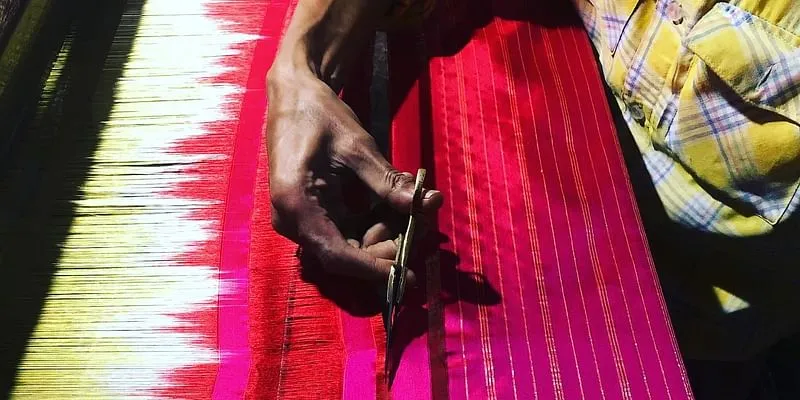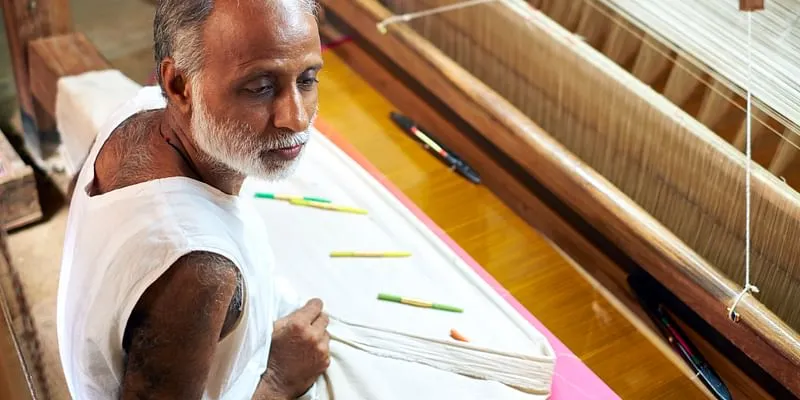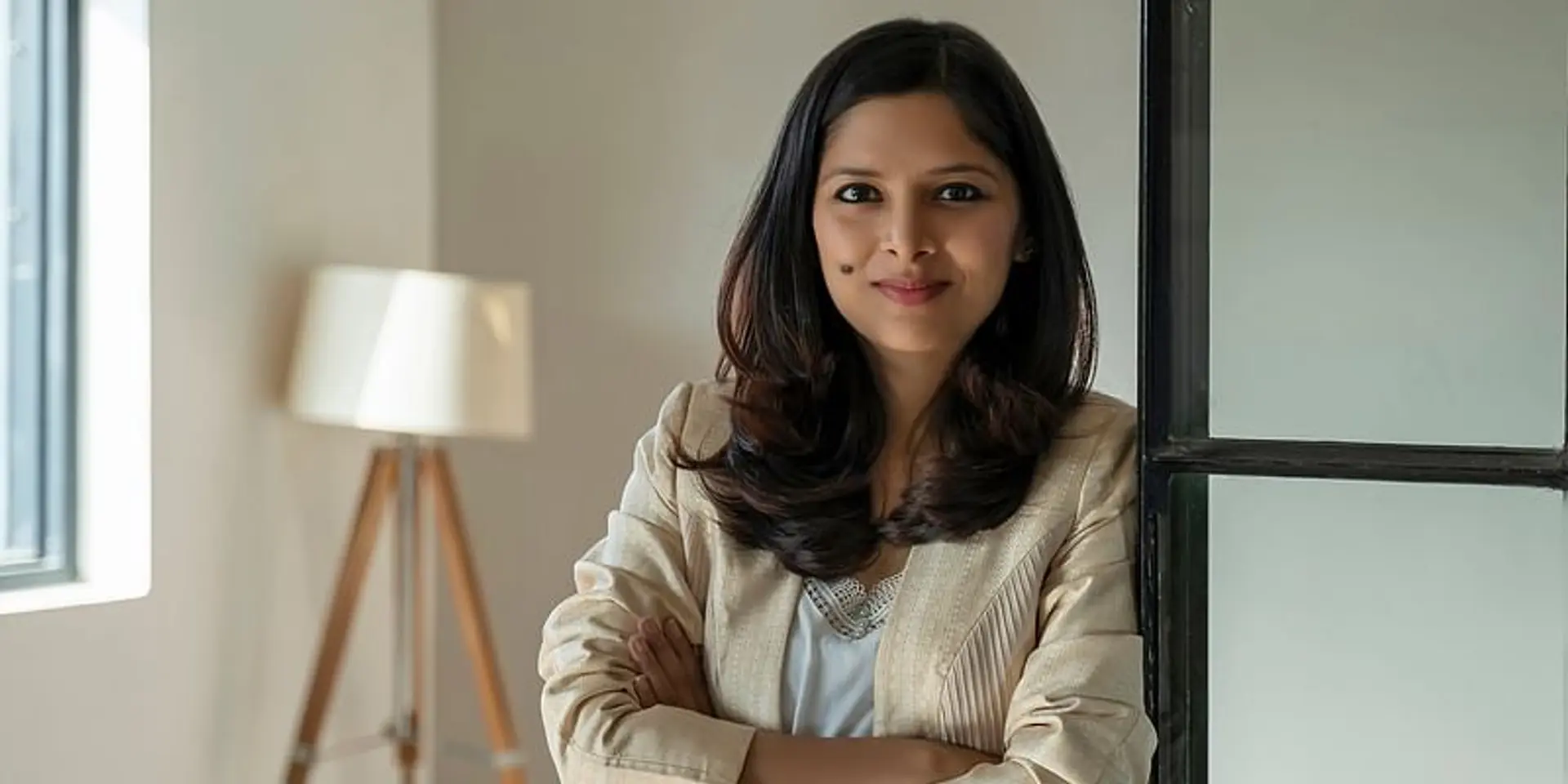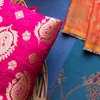How this textile brand’s COVID-19 relief work helped Banarasi handloom artisans to thrive
After reimagining the Banarsi handloom industry, Tilfi Banaras took on the mantle of saving its 2,000 artisans from the difficulties of the pandemic.
Tilfi — an indigenous brand born in Banaras in 2016 — is a modern representation of Banarasi handloom and its ancient heritage, through its fine Banarasi handloom saris, dupattas, lehengas, and modern dresses, woven in pure silk, cotton, koras, georgette, and other fabrics.
Tilfi’s co-founders Aditi Chand, Udit Khanna, and Ujjwal Khanna carry forward the legacy of the Khanna family, which has worked with textiles for over 100 years, as wholesalers across northern India.
By adopting modern practices, Tilfi has put luxury Banarasi handloom on the international stage by strongly believing in its artisan community, coupled with operational efficiency, quality standards, and a business model that appeals to people across ages.
“Our initial effort and investment were to focus on creating exceptional products and of impeccable quality, and we have witnessed steady growth in terms of the traffic on our ecommerce website, which now reports over 200,000 sessions per month. This represents a 100 percent yearly growth in terms of numbers,” says Aditi when asked about the economic feasibility of the business.

A relationship built on trust, respect
Tilfi has a team of 20, divided between Varanasi and Delhi, and over 2,000 artisans with whom it regularly works.
“All our craftsmen are part of the team, and we continue to commission work to each one of them, even if a certain design or collection is discontinued in time. Our business model allows us to prioritise our craft and our craftspeople — the cornerstone of our business,” Aditi says.
The company has a long-standing relationship within its craft community, built on trust and mutual respect.
With conviction, Aditi adds, “We have worked with many weaving families over generations, and as such, accept responsibility for their continued employment and growth. We believe our biggest contributions to the ecosystem are providing it with stability and authenticity.”
COVID-19 relief work
In fact, amidst the COVID-19 pandemic, Tilfi’s founders focused on humanitarian work in and around Varanasi to help the craftsmen.
“During the first lockdown, we distributed food and medical essentials across handloom clusters in distress and kept our team and artisans gainfully engaged and employed the entire time. We made sure that not a single artisan of ours was financially impacted,” she says.
Adding, “During the more severe second wave, we increased our relief focus to assist the larger local community devastated by the pandemic.”
Moreover, Tilfi pledged about 15 percent of all sale proceeds for 15 days in May towards the fight against COVID-19 in Varanasi, its neighbouring districts, and remote villages of rural eastern UP.
The founders also began a fundraising campaign on GiveIndia to amplify their work and increase contributions, which resulted in the collection of around Rs 19 lakh — donated to verified grass-root NGOs who were doing COVID-19 relief efforts.

Through these organisations, Tilfi was able to facilitate oxygen supplies; provide free meals to healthcare professionals, caretakers of the sick and ailing, and crematorium workers; distribute medicines and informational kits; and run vaccination awareness drives.
Aditi says, “We felt it was our responsibility to support the wider underprivileged communities that were affected by the second wave. It was heartening to see several of our customers, Varanasi-based organisations such as Roobaroo Walks, over 100 supporters from around the world, and even our artisans join in our efforts to support Varanasi in its time of need.”
A deep connection with its artisans allowed Tilfi founders to provide direct relief work where it was needed.
During the first wave and lockdown last year, with severe restrictions in place, dry rations were distributed based on the suggestion made by the craftsmen.
While money and food provide only temporary succour, the real need for stability of livelihood comes from a steady supply of work. To this end, Tilfi supported its entire community by continuing to commission new designs, off-taking produced quantities, compensating the artisans in full, and extending financial assistance to the greatest extent possible.
Fortunately, Tilfi could do all this because it has been a digital-first brand since its inception.
“We did not have to face the challenges of transition that many brands had to do, who dependent on physical retail. Our challenges mainly centred around the logistics of operations and ensuring the health and well-being of our team. Even during the second wave, our website remained operational, and we continued to accept orders with delayed shipping times. In fact, we have witnessed strong growth in the last two months,” shares Aditi.

Road ahead
There is no denying that COVID-19 led to an acceptance of luxury e-tail even by the most reticent customers. This allowed Tilfi to almost double its top-line from pre-pandemic levels.

By offering unique selections based on concepts focussing on a particular weave or fabric, the company could sustain the interest of its longstanding customers.
Tilfi’s latest collection — ‘Shakti’ — works extensively with tissue fabric, while reimagining and adapting several other heritage weaving techniques for a contemporary rendition and a graphic effect, including the exquisite Rangkat, Dampach, and Kadhua weaving styles.
At present, Tilfi is available online and through its flagship store in Varanasi.
Although Tilfi’s plans for expansion in physical retail have not materialised yet, it is set to launch a sister label for contemporary apparel — made using Banarasi handwoven textiles — on its ecommerce platform.
The brand’s continued growth, concerted efforts to revive what was once a dying craft, and the ardent support of local craftsmen have firmly put the brand on the map of Indian luxury retail.
“We strongly attribute this to the resilience of our craft community and the love that our patrons have shown us. The intensity of the experience and the solidarity of the team has allowed Tilfi to emerge stronger,” Aditi shares with pride.
Edited by Suman Singh








